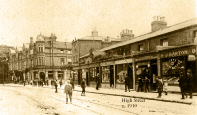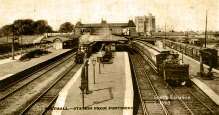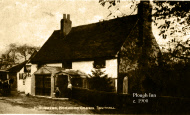Southall 830-
Richard J. Meads




In 1941 bombs dropped in Cambridge Road and destroyed Woolworth's and some shops in the High Street. It was thought that the big gasometer was a guide for the bombing attacks on the gas works. Had the railway bridges been hit, Bailey Bridges were on hand for erection.
There were several daylight raids, one of which caused damage in the Lady Margaret Road and another enemy aircraft came low enough to spray the area with bullets.
In 1944 the Germans were using what became known as 'Doodlebugs'
(a flying bomb). On a Sunday afternoon in June 1944 one fell and destroyed the old Rectory at Norwood. Another, on August 29th 1944, destroyed a number of houses in Adelaide Road. Several more ordinary bombs and incendiaries were scattered about the town. They were very effectively dealt with by the ARP. Casualties were very light, but there was some loss of life.
1942 with the townspeople getting used to the air raid sirens, every effort was being
put into the war. An order was made that all iron railings were to be made available
and that all waste paper be collected. The Council had served over 100,000 meals
in the Borough Cafes, and this was to be increased by opening more halls so as to
be ready to serve 1,400 per day. Mr F. J. Lever was appointed Assistant Chief Warden,
salary £300 per year. On the 9th January, 1942 Councilor Harry Willis died, aged
78. He was a Councillor for twelve years, Chairman 1908-
The Mayor and Mayoress, Councillor and Mrs Amos, launched a Warship Week, March 21st to 28th, the object was to raise £400,000 to adopt the destroyer Boreas. They organised a procession through the town with the Royal Marines and Life Guards Bands taking part. Petty Officer D. J. Morris, DSM, the town's first naval man to be decorated, opened the fund. By the end of ten days £477,174 had been donated and, with the ship adopted, funds were collected for comforts for the crew. Up till April 1942, 250,000 parcels for prisoners of war had been despatched by voluntary workers of St John and Red Cross Committee.
The Council passed plans for a dairy and sterilisation plant for the Norwood Farm Dairy in Havelock Road, where now stands the Temple. The Brentford branch closed on the 4th May, 1942 and, since that time, has only been used for freight. Also in May 1942 the first mention in the Council Chamber regarding prefabricated houses. Featherstone Terrace was declared a clearance area.
At the end of August all men born in 1893 had to register (48 years old). Milk rationing
was introduced. There were 2,379 allotments and more were planned. Southall lost
the chance of having its name put on military tanks -
1943
By this time the town had settled down to war conditions. On the 31st January, at a meeting at the Kings Hall, the plaques were handed over completing the town's adoption of HMS Boreas. Vice Admiral Gordon Camphill, VC, accepted on behalf of the ship. The town's one is still on the right hand wall of the Town Hall.
On February 1st the Fairlawn Hall was taken over by the Fire Service.
The total rate income was £700,382. Rateable value of the town £419,320. Rate 14/2d. A penny rate would produce £1,599.
Councillor G. Harris died 15th February. Councillor for six years, Councillor, J. Hill, died 4th May. He was on the Council for 17 years. He was in business as a newsagent both in Regina Road and Western Road. The MOH, Dr Grundy, was called up to the RAMC in April.
Great efforts were put into a 'Wings for Victory' Savings Drive and £532,805 received. More and more local men reported killed in action and news received that several were prisoners of war. Several more honours had been won. Lieut. G. M. Jensen had won the George Medal.
After 30 years service with schools, Miss Alder retired as Headmistress of Dormers Wells Senior Girls School. Councillor J. M. Sturgeon was elected Mayor for 1944.
1944
Our MP was still Col. J. J. Llewellyn and the rates were still unchanged at 14/2d in the pound.
The HMS Boreas was transferred to the Greek Navy and renamed Salamis and, late in the year, Southall adopted HMS Duckworth.
Schoolchildren were still being evacuated and casualties and honours were in every
edition of the Gazette. The main War Saving event was the `Salute the Soldier' Week.
This was opened by Major-
The hospital committee purchased 3½acres of land at Norwood Green for a new hospital, with the idea of the present one becoming a maternity wing, but this has never been carried out.
Mr C. Butcher retired as Head Postmaster after six years at Southall, 41½years service with GPO Mr W. Pursey was his replacement.
Mr E. J. Burridge, 32 years Relieving Officer for Southall, died on 3rd October, aged 67. County Councilor J. Scott elected Alderman and Mr W. Haigh elected County Councillor in his place. On June 6th Mr W. W. Unwin of Norwood Hall died, leaving Estate valued at £153,759. On December 22nd the County Council bought Norwood Hall and 19 acres of land at a cost of £13,000.
The St John Ambulance purchased a new ambulance at a cost of £800. Miss F. M. Gibbs,
a founder member of the Nursing Division -
The Annual Cricket Match on Norwood Green in 1944 resulted in a win for The Wolf and raised £18.10.0d for Southall Hospital.
Receiving an urgent order from the War Ministry the Cramic Engineering Company feared that, due to shortage of labour, it could not be done in time, 33 boys from the Technical School volunteered to help and the job was completed.
Seven flying bombs in all hit Southall, killing two, injuring 80 and damaging 3,482 houses.
At the request of the Council, representatives of several Women's Organisations went to the Tate Gallery to inspect a prefabricated home and were most favourably impressed. In December Southall was allocated 200.
Councillor Marks, F. G., appointed Mayor for 1945.
Mr Gale, having retired as Parks Superintendant, Mr Collier was appointed, with Mr
Morse as Deputy. With Headquarters in Havelock Road they were responsible for the
re-